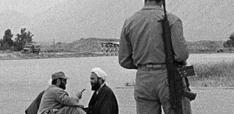Why Iran can decide the U.S. Elections - but may not care to do so
Iran’s regular claim to be a superpower on par only with the United States usually makes people shrug. After all, the Islamic Republic appears to be very much a pariah on the international scene, whereas the U.S. remains – despite all its loss of influence – at the heart of a powerful Western coalition. In addition, many people believe that the upcoming U.S. Presidential election may decide the fate of Iran, either by giving a mandate to the Republican Romney – who made clear during his recent visit to Israel that he would be ready to attack Iran over its disputed nuclear programme – or be renewing the one for the Democrat Obama – who is mildly more supportive of a diplomatic approach but nonetheless is happy to keep the military option on the table.
Yet, a closer looks shows that it may ultimately be the Iranians that determine the outcome of the November elections. That is to say, they could help Obama’s re-election by agreeing on a deal in the nuclear negotiations. This would not only secure him a diplomatic victory strengthening his commander-in-chief credentials, but it would also score him points for the domestic economy by relieving the markets of one of it’s greatest worries – a war in the Persian Gulf. Conversely, Iran could potentially install Romney in the White House by exercising small-scale provocations, verbal or otherwise, both vis-à-vis the Persian Gulf and Israel. Those would not only send oil prices to new levels and hurt the American economy, but also make Obama look weak without giving him a clear cause for war shortly before the elections.
Ironically, it is not the first time that a U.S. Presidential election is positively decided by the regime in Tehran. Ronald Reagan, it is quite fair to say, would probably not have become the 40th President without the Iranian hostage crisis. A year before he was elected, in November 1979, Iranian revolutionary students had stormed the U.S. embassy in Tehran, taking 52 diplomats as hostages. Then-President Carter never recovered from the humiliation of being unable to free the Americans either through negotiations or by a botched rescue attempt. Rumours abound whether and to what extent the leadership of the Republican campaign was secretly in touch with the Iranian regime prior to the 1980 elections. Still, the fact that the latter released the hostages after 444 days on the same day, and even at the hour, of Ronald Reagan’s inauguration, plus the Iran-Contra affair a few years later, which unearthed U.S. weapons sales to Iran via Israel, both give plausibility to any such conspiracy theories.
Switch back to 2012: Assuming that Tehran knows about its influential power over the ‘Great Satan’, the question is whether it would want to use it – and to which result. Again, a look at history may help. To a Western observer it may seem puzzling that, shortly after the Islamic Revolution, the new leadership turned against the ‘dove’ Carter and supported the ‘hawk’ Reagan. Two things may help to explain this seeming contradiction: First of all and on a personal basis, Carter was hated for being the last supporter of the ousted Shah and his protector during the latter’s short-lived exile in the United States. Secondly and more fundamentally, because the Iranian regime is built on depise for the ‘Global Arrogance’ (another word for the U.S.), they simply have no interest in good relations with it. No ayatollah could possibly stand in front of the masses and explain why Iran would have made peace with its enemy number one (a position variably shared with Israel and the United Kingdom). Hostility to the U.S. is a raison d’être of the Islamic Republic and the latter would not easily deprive itself of one of its fundamental pillars.
Does this mean that the regime in Tehran would again prefer the hawk to the (alleged) dove? Most importantly, the situation today is more complex than 32 years ago, and Iran cannot simply push a button to exert its potential influence. In 1979/80, Iran had something (the hostages) that America clearly wanted and it was in their power to withhold this pawn in order to humiliate the sitting President. Today, not only are the lines of causation more complex with regard to favouring one candidate over the other. Agreeing to a compromise in the negotiations to please Obama may still make the President prone to allegations of appeasement, plus the deal may unravel at the Iranian home front precisely for the reasons stated above; or, the provocations intended to help Romney may get out of hand, leading to a U.S. intervention that makes American voters rally around their current leader.
But there is also a crucial third factor whose reactions cannot easily be counted into the equation: Israel. The Netanyahu government appears as messianic in its neglect of the wider consequences of an attack on Iran as the regime there is negligent of the inherent dangers that its defiance of international calls for nuclear transparency poses for its population. If the U.S. government cannot be sure of ‘containing’ its closest ally, how could the Iranian leadership assume that an Israeli attack does not derail any attempt to exert influence over the U.S. elections?
In the end, it is likely that Tehran does not care much about who the next U.S. president is. With only one quickly aborted try at serious negotiations in 2009 and a series of ever-harder sanctions following, Obama is enough of a hawk to be portrayed as the evil American that the Iranians need for internal consumption. In addition, it is impossible for him to move before the elections, as he would immediately be targeted by the Republicans for offering any concessions needed to make the Iranian side move on the nuclear issue. What is more, an Iran-hostile Congress has made it virtually impossible to reach a compromise by imposing unfeasible red lines and setting unachievable objectives. Eventual success in the negotiations would soon be perceived as failure at home. Given this conundrum, the regime may be happy to know that it could influence the elections – like it did in 1980 – but relax and wait to see its actual outcomes.
Hold on, it can in now way quite relax, because presidential elections are due in Iran around June 2013. The leadership struggle is already in full swing, and it is of course more important who will succeed President Ahmadinejad – another representative of his ‘deviant’ current? a true follower of the Supreme Leader, at last? or, Allah forbid, another reformist? – than who will soon govern on the other side of the Atlantic.
In this aspect, alas, the two ‘superpowers’ are very much alike: Domestic politics trump any serious foreign policy considerations.


